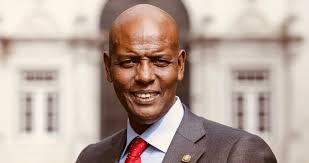Although this case should be viewed as separate from the multifaceted legal challenges facing former French President Nicolas Sarkozy, both, however, are major indicators of the French judiciary’s intensified focus on anti-corruption efforts involving powerful figures.
The latest developments in the looming trial of a retired French Air Force General and a European civil servant over an alleged influence-peddling scheme for a €100 million diplomatic complex in Mogadishu, Somalia, is less a routine court case and more a testament to the unyielding campaign waged by a single individual: Abshir Aden Ferro.
The Franco-Somali businessman and politician has spent nearly a decade fighting to expose the alleged corruption at the heart of a major European Union construction tender. A battle he has directly linked to the broader effort to restore good governance and integrity in his home country. The French National Financial Prosecutor’s Office (PNF) is actively investigating the allegations brought by Abshir Aden Ferro, underscoring France’s extraterritorial jurisdiction over its citizens alleged corrupt acts abroad.
The Spark of the Scandal
The entire affair, dubbed “Somaligate” as Financial Afrik already reported, burst into public view after a secretly recorded meeting in November 2015. Abshir Aden Ferro, whose companies were involved in the tender, allegedly walked out of the meeting of the Rapid consortium—the French group that secured the contract—after hearing the former general, Cyrille C., discuss a supposed 2% commission intended for an intermediary to guarantee the contract’s award.
Ferro’s immediate response was to take action, filing a corruption complaint with the Parisian National Financial Prosecutor’s Office (PNF) in April 2016. This single act of whistleblowing set in motion the lengthy, nine-year investigation that eventually led the PNF to push for a criminal trial. The PNF’s final synthesis note, signed in September 2025, recommends that multiple parties be sent before the Paris Criminal Court on serious “integrity offenses.”
While a trial date has not yet been set, the charges detail a complex web of alleged misconduct. Investigators allege that, in his role as a lobbyist for Rapid, the Former General Cyrille C., who is expected to face trial for influence-peddling, benefited from and provided unauthorized information—which was not officially shared with other bidders—to secure the contract’s award. This charge is underpinned by the secret recording mentioning the 2% commission.
Another protagonist of this sense like espionage novel, the European Official Gérard H., is suspected of illegal taking of interest. The investigation links him to Cyrille C. through personal renting, professional shared career paths, and financial ties via an umbrella company, suggesting a conflict of interest in his major role of monitoring the tender within the European External Action Service (EEAS).
According to legal documents, the PNF also seeks to prosecute three corporate managers at the time for influence-peddling and the three companies themselves as legal entities. This moves stems from emails sent by Cyrille C. to these managers referencing “discreet meetings” with an intermediary, with the PNF arguing that their failure to react amounted to complicity in the alleged scheme.
A Political Crusade Against Corruption
For Abshir Aden Ferro, the French legal battle is more than just about a single construction contract; it is a crucial front in his political campaign to become a change-maker in Somalia. Ferro is a candidate in the upcoming 2026 Somali presidential elections, and his platform is heavily focused on establishing an effective democracy (“one man, one vote”), eliminating the militant group Al-Shabaab, and eradicating the systemic corruption that he argues is undermining his nation.
“I am very proud to be dubbed ‘Mr. Clean’ in this campaign” he stated in his Parisian hotel on Friday while talking to journalists. If he has repeatedly used the “Somaligate” case, this is to “highlight the perceived collusion and lack of transparency within European institutions’ external actions in Africa”, he insisted.
By exposing the alleged misconduct involving European officials and a high-ranking French military figure, Ferro aims to galvanize support for his vision of a clean, well-managed Somalia, free from the exploitation of international aid and foreign influence. He recalls a clause in the tender that even his French wife was appalled to, namely that, after construction, they “shall not employ Somali nationals or individuals of Somali”, which is discriminatory and illegal. Therefore, he won the case in the commercial court. Previously to his complaint with OLAF and PNF, African Sky, the second bidder had already filed their own complaint in 2019.
The Long Road to Justice
Despite six defamation trials -that he won each time- and threats to his life and his family’s security, the successful Franco-Somali businessman has publicly stated his determination to pursue the case, drawing parallels with the “Qatargate” or other high-profile European scandals to argue for sweeping reforms.
A specific trial date for the former French general, Cyrille C., and the European official, Gérard H., has not been publicly announced. “The PNF signed the final synthesis note for referral to the Paris Criminal Court in September 2025, but the scheduling of the hearings remains pending. It will probably happen in 2026”, Me Xavier Argenton stated in a telephone conversation.
As the defendants prepare for court, however, they will face a prosecutor’s case built largely on the initial complaint and the secret recording that Abshir Aden Ferro courageously brought to light. His ongoing fight represents a rare and persistent effort by an African political figure to utilize European judicial systems to challenge alleged corruption tied to projects on the African continent, making him a symbol of the fight for probity in international business.
“Yes, it is costly, and I am not even sure that I will ever be reimbursed for my legal expenses. But this is the price to pay for justice, and it has no price”, he said.


